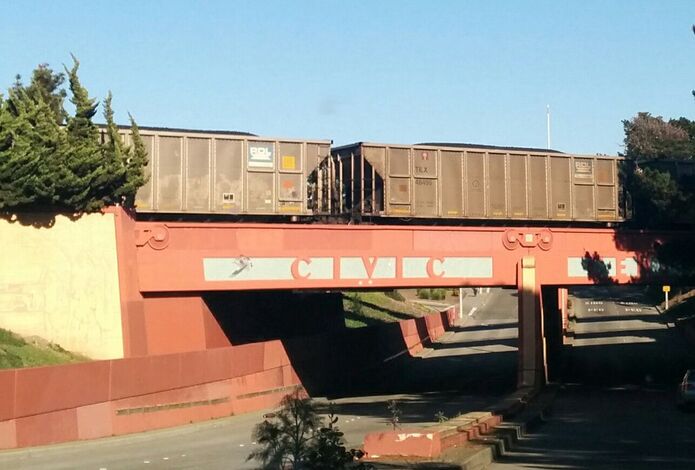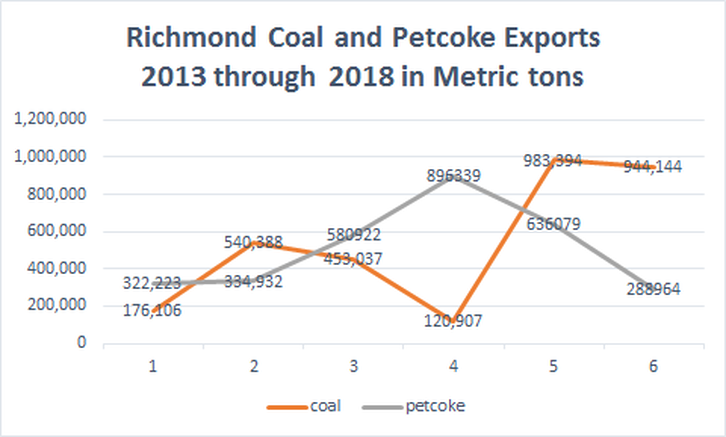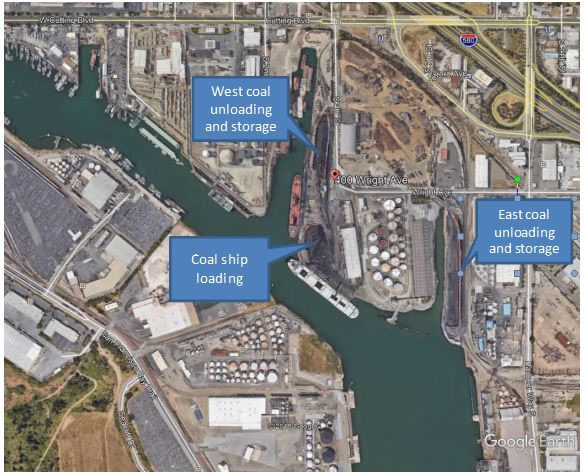On Tuesday, January 14, 2020, the Richmond City Council voted 5-1 in favor of the Richmond Coal Ordinance. Council member Demnlus Johnson III was absent, and Vice Mayor Nat Bates voted no.
This land-use ordinance relies on the city's police powers to regulate businesses in the interest of residents' health and safety, and it contains three main provisions:
—> No Coal in Richmond gathered more than 2,300 paper and website signatures on this letter to the city council urging them to pass the Richmond Coal Ordinance.
This land-use ordinance relies on the city's police powers to regulate businesses in the interest of residents' health and safety, and it contains three main provisions:
- It prohibits new coal and pet coke operations on private land in the city;
- It prevents existing facilities from expanding;
- It provides for a graduated phase-out of coal and pet coke operations.
—> No Coal in Richmond gathered more than 2,300 paper and website signatures on this letter to the city council urging them to pass the Richmond Coal Ordinance.
Read the science! A public health and economic analysis of the terminal, completed in December 2019, shows the serious health effects of coal and pet coke dust, and how the terminal has ample opportunities to transition to safer commodities, and more.
Encouraging! This letter, sent to Richmond's Mayor and City Council from former Chief Counsel of California EPA Christiana Tiedemann, explains why, in her expert opinion, fears of litigation by the terminal and the coal industry are unwarranted.
"[Regarding the ordinance] ..a legal challenge will fail, and it should do so without protracted litigation because of the clear facial validity of the proposed amendments [to the Richmond Municipal Code]."
Encouraging! This letter, sent to Richmond's Mayor and City Council from former Chief Counsel of California EPA Christiana Tiedemann, explains why, in her expert opinion, fears of litigation by the terminal and the coal industry are unwarranted.
"[Regarding the ordinance] ..a legal challenge will fail, and it should do so without protracted litigation because of the clear facial validity of the proposed amendments [to the Richmond Municipal Code]."
Impact
Coal and pet coke dust contain substances that cause severe, permanent harm to people of all ages, especially children. These include:
- Mercury: kills brain and nerve cells in all living creatures, including humans; leads to lifelong developmental problems in young people;
- Arsenic: causes death by cancer of the bladder, lungs, and/or skin;
- Cadmium: causes death by cancer and kidney failure;
- Lead: causes life-altering developmental problems;
- Silica: causes death by lung cancer.
Data
This review, which provides evidence of the detrimental health effects of coal and petroleum coke dust, was written for the Oakland City Council by public health experts.
What is PM2.5, and why does it matter?
Coal and pet coke dust contains fine particulate matter (PM 2.5). According to the World Health Organization and the U.S. EPA, there is no safe limit for PM 2.5.
A recent study found that exposure to PM 2.5 in the first years of life is associated with poorer performance in memory and attention. And a new study underscores the strong association between exposure to PM2.5 and cardiopulmonary mortality risk. The latter study looked at a large cohort of adults living in the US ranging in age from 18 to 84 and followed them for nearly three decades.
A recent study found that exposure to PM 2.5 in the first years of life is associated with poorer performance in memory and attention. And a new study underscores the strong association between exposure to PM2.5 and cardiopulmonary mortality risk. The latter study looked at a large cohort of adults living in the US ranging in age from 18 to 84 and followed them for nearly three decades.
Background
Historically, the Levin-Richmond Terminal exported small amounts of coal and petroleum coke. As U.S. demand for coal began to drop, the terminal was approached by the coal industry and ramped up its operations (see graph below). It now handles and stores megatons of dirty coal and poisonous pet coke. Pet coke is a solid carbon material full of toxic heavy metals, the residue of petroleum refining that's so highly polluting it cannot legally be burned in the U.S. (except by refineries).
Why? As we transition to a fossil-free future, the coal industry is maintaining its profits by selling overseas. Coal-burning power plants abroad make West Coast ports such as Richmond prime targets for coal exports. Richmond and Stockton are the only ports on the West Coast that ship coal; all other cities have successfully prevented their ports from allowing coal operations.
In 2018, the Levin-Richmond Terminal shipped 944,144 metric tons of coal. That's a greater than 435% increase since 2013. Coal arrives by rail in mile-long trains of uncovered cars from Utah. Coal and pet coke are stored in large piles at the terminal only a few blocks from residential neighborhoods, and coal dust has been found in samples taken 1.4 miles downwind.
Why? As we transition to a fossil-free future, the coal industry is maintaining its profits by selling overseas. Coal-burning power plants abroad make West Coast ports such as Richmond prime targets for coal exports. Richmond and Stockton are the only ports on the West Coast that ship coal; all other cities have successfully prevented their ports from allowing coal operations.
In 2018, the Levin-Richmond Terminal shipped 944,144 metric tons of coal. That's a greater than 435% increase since 2013. Coal arrives by rail in mile-long trains of uncovered cars from Utah. Coal and pet coke are stored in large piles at the terminal only a few blocks from residential neighborhoods, and coal dust has been found in samples taken 1.4 miles downwind.
This graph shows the increase of coal and pet coke exports since 2013. Because of space limitations in the original graphic, years are represented by numbers: 1=2013, 2=2014, etc.
These figures reveal that from 2013 through 2018, there has been an astonishing 436% increase in coal shipments coming through the city of Richmond.
These figures reveal that from 2013 through 2018, there has been an astonishing 436% increase in coal shipments coming through the city of Richmond.



